英文版中国古代诗歌
- 格式:ppt
- 大小:3.02 MB
- 文档页数:11
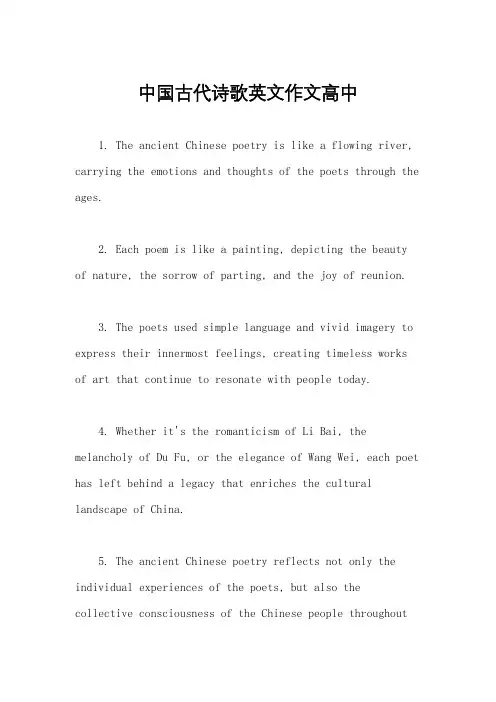
中国古代诗歌英文作文高中1. The ancient Chinese poetry is like a flowing river, carrying the emotions and thoughts of the poets through the ages.2. Each poem is like a painting, depicting the beauty of nature, the sorrow of parting, and the joy of reunion.3. The poets used simple language and vivid imagery to express their innermost feelings, creating timeless works of art that continue to resonate with people today.4. Whether it's the romanticism of Li Bai, the melancholy of Du Fu, or the elegance of Wang Wei, each poet has left behind a legacy that enriches the cultural landscape of China.5. The ancient Chinese poetry reflects not only the individual experiences of the poets, but also thecollective consciousness of the Chinese people throughouthistory.6. Through the verses, we can glimpse into the social, political, and cultural aspects of ancient China, gaining a deeper understanding of the country's rich heritage.7. The rhythmic and melodic qualities of the poetry also make it a delight to recite and listen to, adding an extra layer of enjoyment to the reading experience.8. In today's fast-paced world, the timeless wisdom and beauty of ancient Chinese poetry continue to inspire and captivate readers around the globe.。
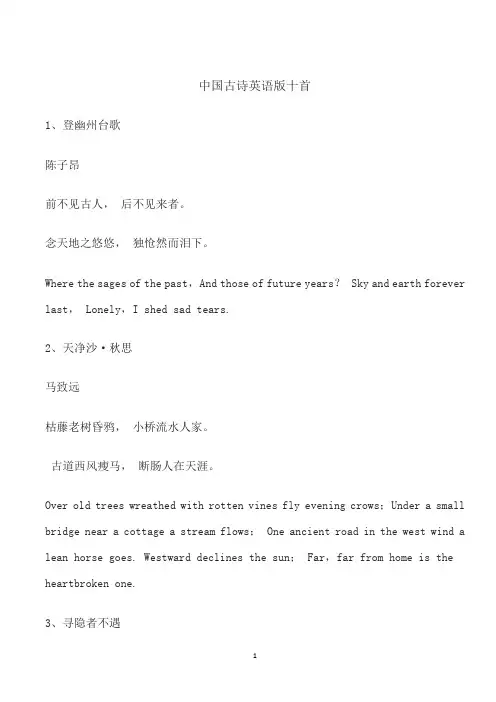
中国古诗英语版十首1、登幽州台歌陈子昂前不见古人,后不见来者。
念天地之悠悠,独怆然而泪下。
Where the sages of the past, And those of future years? Sky and earth forever last, Lonely,I shed sad tears.2、天净沙·秋思马致远枯藤老树昏鸦,小桥流水人家。
古道西风瘦马,断肠人在天涯。
Over old trees wreathed with rotten vines fly evening crows;Under a small bridge near a cottage a stream flows; One ancient road in the west wind a lean horse goes. Westward declines the sun; Far,far from home is the heartbroken one.3、寻隐者不遇贾岛松下问童子,言师采药去。
只在此山中,云深不知处。
I ask your lad neath a pine-tree,“My master’s gone for herbs,” says he.You hide amid the mountains proud,I know not where deep in the cloud.4、江雪柳宗元千山鸟飞绝,万径人踪灭。
孤舟蓑笠翁,独钓寒江雪。
From hill to hill no bird in flight, From path to path no man in sight.A lonely fisherman afloat, is fishing snow on lonely boat.5、独坐敬亭山李白众鸟高飞尽,孤云独去闲。
相看两不厌,只有敬亭山。
All birds have flown away,so high, A lonely cloud drifts on,so free. Gazing on Mount lingting,nor I, Am tired of him,nor he of me.6、问刘十九白居易绿蚁新醅酒,红泥小火炉。
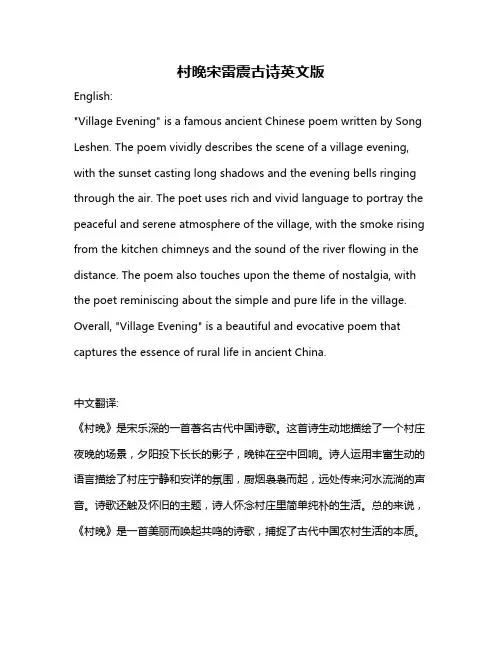
村晚宋雷震古诗英文版English:"Village Evening" is a famous ancient Chinese poem written by Song Leshen. The poem vividly describes the scene of a village evening, with the sunset casting long shadows and the evening bells ringing through the air. The poet uses rich and vivid language to portray the peaceful and serene atmosphere of the village, with the smoke rising from the kitchen chimneys and the sound of the river flowing in the distance. The poem also touches upon the theme of nostalgia, with the poet reminiscing about the simple and pure life in the village. Overall, "Village Evening" is a beautiful and evocative poem that captures the essence of rural life in ancient China.中文翻译:《村晚》是宋乐深的一首著名古代中国诗歌。
这首诗生动地描绘了一个村庄夜晚的场景,夕阳投下长长的影子,晚钟在空中回响。
诗人运用丰富生动的语言描绘了村庄宁静和安详的氛围,厨烟袅袅而起,远处传来河水流淌的声音。
诗歌还触及怀旧的主题,诗人怀念村庄里简单纯朴的生活。
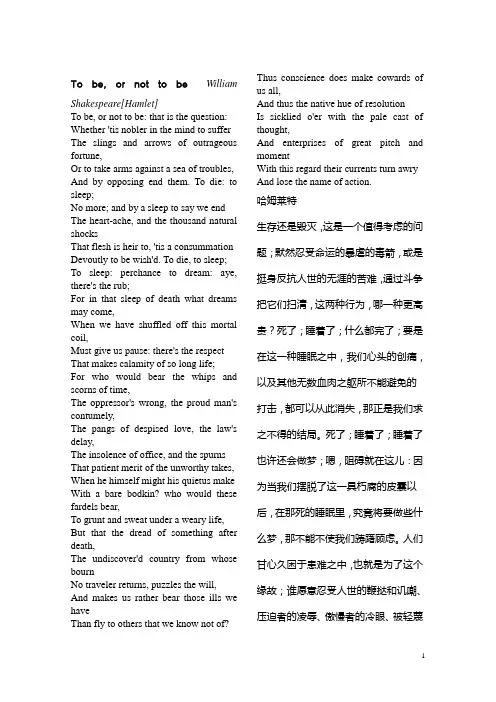
To be, or not to be William Shakespeare[Hamlet]To be, or not to be: that is the question: Whether 'tis nobler in the mind to suffer The slings and arrows of outrageous fortune,Or to take arms against a sea of troubles, And by opposing end them. To die: to sleep;No more; and by a sleep to say we end The heart-ache, and the thousand natural shocksThat flesh is heir to, 'tis a consummation Devoutly to be wish'd. To die, to sleep; To sleep: perchance to dream: aye, there's the rub;For in that sleep of death what dreams may come,When we have shuffled off this mortal coil,Must give us pause: there's the respect That makes calamity of so long life;For who would bear the whips and scorns of time,The oppressor's wrong, the proud man's contumely,The pangs of despised love, the law's delay,The insolence of office, and the spurns That patient merit of the unworthy takes, When he himself might his quietus make With a bare bodkin? who would these fardels bear,To grunt and sweat under a weary life, But that the dread of something after death,The undiscover'd country from whose bournNo traveler returns, puzzles the will, And makes us rather bear those ills we haveThan fly to others that we know not of? Thus conscience does make cowards of us all,And thus the native hue of resolutionIs sicklied o'er with the pale cast of thought,And enterprises of great pitch and momentWith this regard their currents turn awry And lose the name of action.哈姆莱特生存还是毁灭,这是一个值得考虑的问题;默然忍受命运的暴虐的毒箭,或是挺身反抗人世的无涯的苦难,通过斗争把它们扫清,这两种行为,哪一种更高贵?死了;睡着了;什么都完了;要是在这一种睡眠之中,我们心头的创痛,以及其他无数血肉之躯所不能避免的打击,都可以从此消失,那正是我们求之不得的结局。
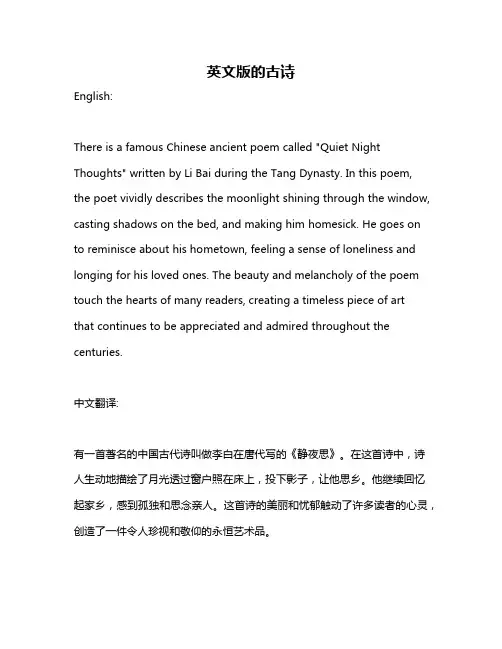
英文版的古诗
English:
There is a famous Chinese ancient poem called "Quiet Night Thoughts" written by Li Bai during the Tang Dynasty. In this poem, the poet vividly describes the moonlight shining through the window, casting shadows on the bed, and making him homesick. He goes on
to reminisce about his hometown, feeling a sense of loneliness and longing for his loved ones. The beauty and melancholy of the poem touch the hearts of many readers, creating a timeless piece of art
that continues to be appreciated and admired throughout the centuries.
中文翻译:
有一首著名的中国古代诗叫做李白在唐代写的《静夜思》。
在这首诗中,诗人生动地描绘了月光透过窗户照在床上,投下影子,让他思乡。
他继续回忆起家乡,感到孤独和思念亲人。
这首诗的美丽和忧郁触动了许多读者的心灵,创造了一件令人珍视和敬仰的永恒艺术品。
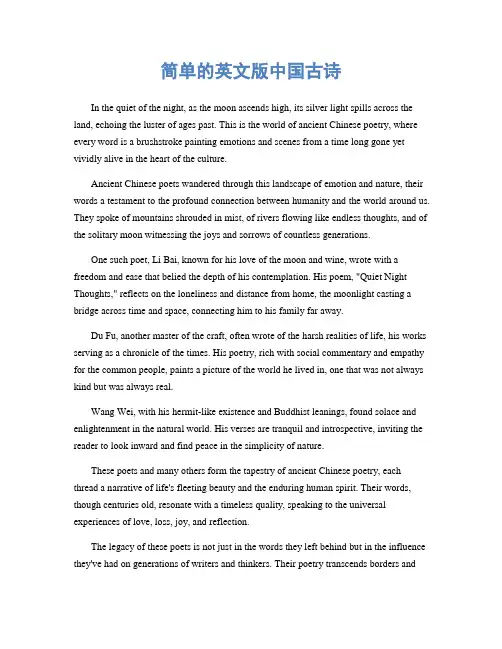
简单的英文版中国古诗In the quiet of the night, as the moon ascends high, its silver light spills across the land, echoing the luster of ages past. This is the world of ancient Chinese poetry, where every word is a brushstroke painting emotions and scenes from a time long gone yet vividly alive in the heart of the culture.Ancient Chinese poets wandered through this landscape of emotion and nature, their words a testament to the profound connection between humanity and the world around us. They spoke of mountains shrouded in mist, of rivers flowing like endless thoughts, and of the solitary moon witnessing the joys and sorrows of countless generations.One such poet, Li Bai, known for his love of the moon and wine, wrote with a freedom and ease that belied the depth of his contemplation. His poem, "Quiet Night Thoughts," reflects on the loneliness and distance from home, the moonlight casting a bridge across time and space, connecting him to his family far away.Du Fu, another master of the craft, often wrote of the harsh realities of life, his works serving as a chronicle of the times. His poetry, rich with social commentary and empathy for the common people, paints a picture of the world he lived in, one that was not always kind but was always real.Wang Wei, with his hermit-like existence and Buddhist leanings, found solace and enlightenment in the natural world. His verses are tranquil and introspective, inviting the reader to look inward and find peace in the simplicity of nature.These poets and many others form the tapestry of ancient Chinese poetry, each thread a narrative of life's fleeting beauty and the enduring human spirit. Their words, though centuries old, resonate with a timeless quality, speaking to the universal experiences of love, loss, joy, and reflection.The legacy of these poets is not just in the words they left behind but in the influence they've had on generations of writers and thinkers. Their poetry transcends borders anderas, inviting all who read them to partake in a journey of the soul, one that leads to a deeper understanding of ourselves and the world we share.As we delve into the simple yet profound world of these ancient verses, we find that despite the passage of time, the emotions and thoughts expressed are as relevant now as they were then. The human experience, with all its complexity and wonder, is captured in the lines of their work, offering a window into the past and a mirror reflecting our own lives.In studying these poems, we not only gain insight into the rich cultural heritage of China but also connect with the poets who, with a few well-chosen words, could evoke the most profound of feelings. Their poetry serves as a reminder of the power of language and the enduring nature of human expression.Through the simple elegance of ancient Chinese poetry, we are reminded of the beauty that exists in the world and within ourselves. It is a beauty that endures, unmarred by time, a testament to the indomitable spirit of humanity and the art that arises from it. As we continue to read and appreciate these works, we carry forward the legacy of the poets, ensuring that their voices, like the moon's gentle glow, will never fade into the silence of history. 。
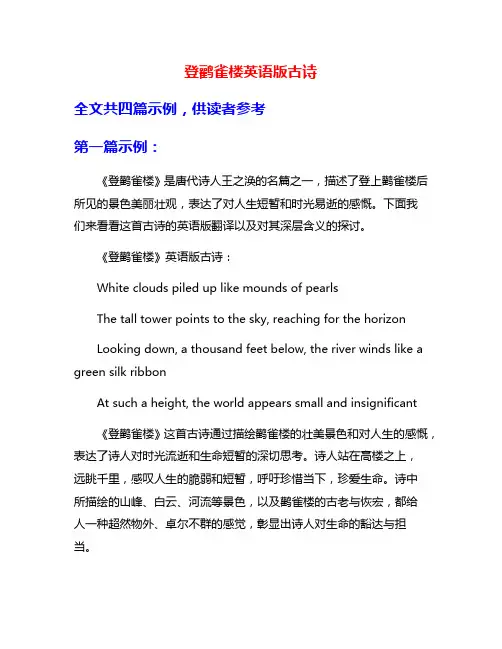
登鹳雀楼英语版古诗全文共四篇示例,供读者参考第一篇示例:《登鹳雀楼》是唐代诗人王之涣的名篇之一,描述了登上鹳雀楼后所见的景色美丽壮观,表达了对人生短暂和时光易逝的感慨。
下面我们来看看这首古诗的英语版翻译以及对其深层含义的探讨。
《登鹳雀楼》英语版古诗:White clouds piled up like mounds of pearlsThe tall tower points to the sky, reaching for the horizonLooking down, a thousand feet below, the river winds like a green silk ribbonAt such a height, the world appears small and insignificant《登鹳雀楼》这首古诗通过描绘鹳雀楼的壮美景色和对人生的感慨,表达了诗人对时光流逝和生命短暂的深切思考。
诗人站在高楼之上,远眺千里,感叹人生的脆弱和短暂,呼吁珍惜当下,珍爱生命。
诗中所描绘的山峰、白云、河流等景色,以及鹳雀楼的古老与恢宏,都给人一种超然物外、卓尔不群的感觉,彰显出诗人对生命的豁达与担当。
这首古诗的英语翻译通过优美的语言和抒情的笔调,将原诗的意境和情感传达得淋漓尽致。
诗中用白云如珍珠、太阳洒金般的描写,让人仿佛置身仙境,感受到大自然的奇妙与壮美。
诗人通过对自然景色和人生的观察,和人们分享了他的感慨和思考,引发读者对生命的反思和珍惜。
王之涣的《登鹳雀楼》是一首具有深刻内涵和艺术价值的古诗,它通过对自然景色和人生的描绘,表达了诗人对生命和时光的思考,引导人们珍惜当下,珍爱生命。
无论是中文版还是英语版,这首古诗都值得我们深入品味和领会,感受其中的诗意与哲理,从中汲取力量和启示。
愿我们都能像诗中的鹳雀楼一样,笔直直立,矗立在自己心中的高处,永远坚强和自信。
第二篇示例:《登鹳雀楼英语版古诗》是中国唐代诗人王之涣创作的一首脍炙人口的名篇。
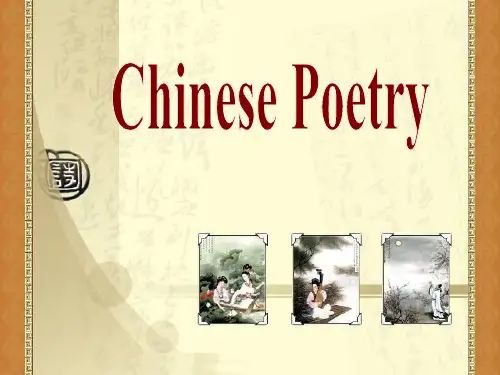
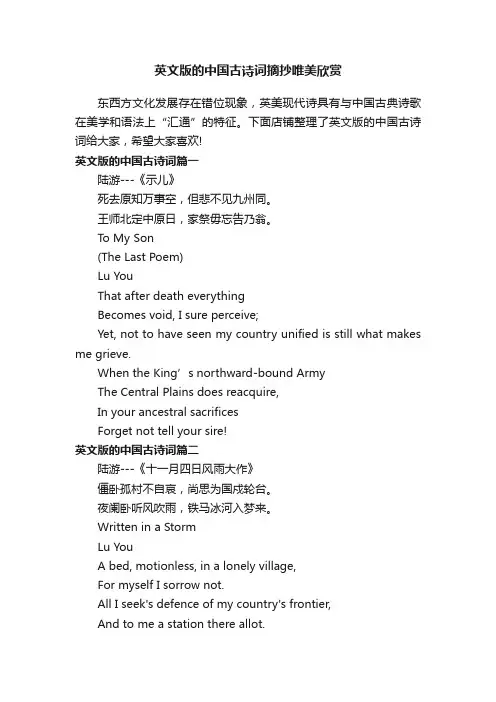
英文版的中国古诗词摘抄唯美欣赏东西方文化发展存在错位现象,英美现代诗具有与中国古典诗歌在美学和语法上“汇通”的特征。
下面店铺整理了英文版的中国古诗词给大家,希望大家喜欢!英文版的中国古诗词篇一陆游---《示儿》死去原知万事空,但悲不见九州同。
王师北定中原日,家祭毋忘告乃翁。
To My Son(The Last Poem)Lu YouThat after death everythingBecomes void, I sure perceive;Yet, not to have seen my country unified is still what makes me grieve.When the King’s northward-bound ArmyThe Central Plains does reacquire,In your ancestral sacrificesForget not tell your sire!英文版的中国古诗词篇二陆游---《十一月四日风雨大作》僵卧孤村不自哀,尚思为国戍轮台。
夜阑卧听风吹雨,铁马冰河入梦来。
Written in a StormLu YouA bed, motionless, in a lonely village,For myself I sorrow not.All I seek's defence of my country's frontier,And to me a station there allot.Lying in the depth of the night I listenTo the winds blowing the rain,And iron-clad horses o'er frozen rivers,As of old, invade my dreams again.英文版的中国古诗词篇三《望月怀远》张九龄海上生明月,天涯共此时。
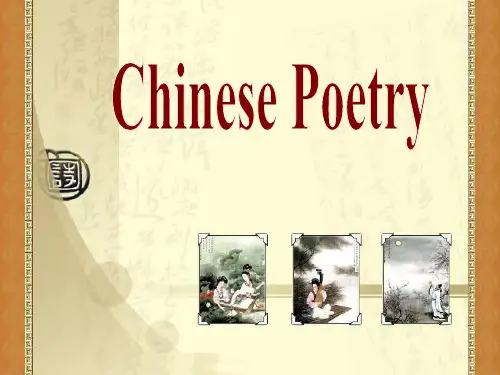
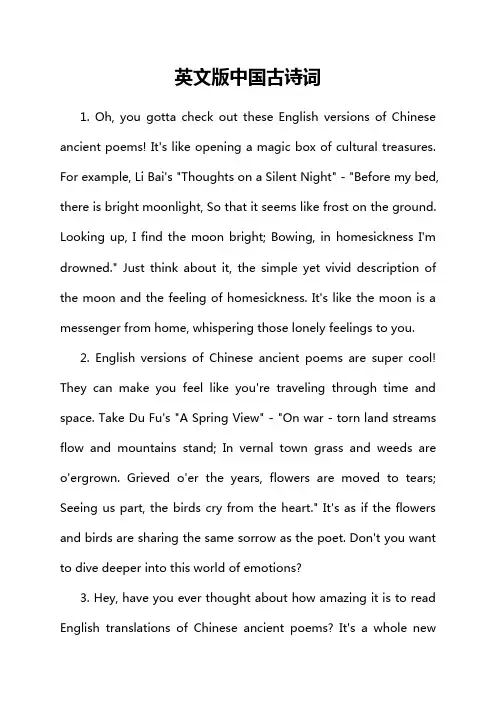
英文版中国古诗词1. Oh, you gotta check out these English versions of Chinese ancient poems! It's like opening a magic box of cultural treasures. For example, Li Bai's "Thoughts on a Silent Night" - "Before my bed, there is bright moonlight, So that it seems like frost on the ground. Looking up, I find the moon bright; Bowing, in homesickness I'm drowned." Just think about it, the simple yet vivid description of the moon and the feeling of homesickness. It's like the moon is a messenger from home, whispering those lonely feelings to you.2. English versions of Chinese ancient poems are super cool! They can make you feel like you're traveling through time and space. Take Du Fu's "A Spring View" - "On war - torn land streams flow and mountains stand; In vernal town grass and weeds are o'ergrown. Grieved o'er the years, flowers are moved to tears; Seeing us part, the birds cry from the heart." It's as if the flowers and birds are sharing the same sorrow as the poet. Don't you want to dive deeper into this world of emotions?3. Hey, have you ever thought about how amazing it is to read English translations of Chinese ancient poems? It's a whole newexperience. Consider Wang Wei's "Deer Enclosure" - "Empty the hills, no man in sight, Yet voices echo here. Deep in the woods slanting sunlight, Falls on the mossy ground." It feels like you're right there in that quiet forest, hearing the echoes and seeing the sunlight filtering through the trees. It's just so peaceful.4. English - translated Chinese ancient poems are like a bridge between two different cultures. Let me show you an example. Meng Hao - ran's "Spring Morning" - "This spring morning in bed I'm lying, Not to awake till birds are crying. After one night of wind and showers, How many are the fallen flowers?" You can almost smell the fresh air of spring and feel the poet's laziness in the morning and then the little bit of melancholy when thinking about the fallen flowers.5. Oh my! English versions of Chinese ancient poems can really stir up your emotions. For instance, Liu Yong's "Bidding the Lonely Soul Farewell" - "All around is gloom: we part on the long, long River of Farewell. In the cold, dim twilight I see your lonely figure disappear. Where is your destination? Only the waves of River of Farewell flow on as before." It's like you're there on the riverbank,watching someone you care about leave forever. Doesn't it make your heart ache a little?6. You know what? English translations of Chinese ancient poems are full of surprises. Look at Li Shangyin's "The Silk - Worm" - "The silk - worm of spring will weave until death a shroud of silk. From lovesick heart the candles burn down to ashes grey." It's as if the silk - worm and the candles are symbols of unending love and dedication. It makes you wonder about the power of love in different cultures.7. English versions of Chinese ancient poems are a doorway toa different world of beauty. Take Su Shi's "Prelude to Water Melody" - "How long will the full moon appear? Wine cup in hand, I ask the sky. I do not know what time of the year it would be tonight in the heavens on this night. I'd like to ride the wind to fly home. Yet I fear the crystal and jade mansions are much too high and cold for me." It's like a conversation with the sky, full of longing and a touch of hesitation. It's so fascinating.8. Oh, the English - translated Chinese ancient poems are like little gems waiting to be discovered. For example, Bai Juyi's "TheSong of Everlasting Sorrow" - "The beauty of Yang Yuhuan was so great that she was chosen as the emperor's favorite. Her face was like a flower that could make fish sink and wild geese fall." This vivid description of beauty makes you gasp. It's like seeing the most beautiful woman in the world right in front of your eyes.9. English versions of Chinese ancient poems can make you see things from a different perspective. Consider Zhang Jiuling's "Looking at the Moon and Thinking of One Far Away" - "The bright moon is rising above the sea, Everyone far away enjoy the same moment. Lovers complain of long separation; All night long they toss and sigh of loneliness." It's like the moon is a common bond for all those who are far apart and missing someone. It makes you think about the universality of human feelings.10. Well, English - translated Chinese ancient poems are just a wonderful thing. They blend the charm of Chinese culture with the accessibility of the English language. Take Qu Yuan's "Li Sao" - "Long did I sigh to hold back tears; Saddened I am by the grief of my people." You can feel the poet's deep love for his people and his pain. It's like you're sharing his emotions. In my opinion, theseEnglish versions of Chinese ancient poems are not only a great way to enjoy Chinese literature but also a means to promote cultural exchange between the East and the West.。
中国古典经典诗词的英文版第一篇:中国古典经典诗词的英文版1、但愿人长久,千里共婵娟。
We wish each other a long life so as to share the beauty of this graceful moonlight, even though miles apart.2、独在异乡为异客,每逢佳节倍思亲。
A lonely stranger in a strange land I am cast, I miss my family all the more on every festive day.3、大江东去,浪淘尽,千古风流人物。
The endless river eastward flows;with its huge waves are gone all those gallant heroes of bygone years.4、二人同心,其利断金。
If two people are of the same mind, their sharpness can cut through metal.5、富贵不能淫,贫贱不能移,威武不能曲,此之谓大丈夫。
It is a true great man whom no money and rank can confuse, no poverty and hard ship can shake, and no power and force can suffocate.6、海内存知己,天涯若比邻。
A bosom friend afar brings distance near.7、合抱之木,生于毫末,九层之台,起于累土;千里之行始于足下。
A huge tree that fills one’s arms grows from a tiny seedling;a nine-storied tower rises from a heap of earth;a thousand li journey starts with the first step.8、祸兮,福之所依;福兮,祸之所伏。
中国诗歌带英语翻译3篇中国古典诗歌是中国传统文化的重要组成部分,包含着中国文化精髓。
中国古典诗歌英译因此一直是文学大家实践的重要工作。
下面是店铺带来的中国诗歌带英语翻译,欢迎阅读!中国诗歌带英语翻译篇一七言律诗王维和贾舍人早朝大明宫之作绛帻鸡人送晓筹,尚衣方进翠云裘。
九天阊阖开宫殿,万国衣冠拜冕旒。
日色才临仙掌动,香烟欲傍衮龙浮。
朝罢须裁五色诏,佩声归向凤池头。
Seven-character-regular-verseWang WeiAN EARLY AUDIENCE AT THE PALACE OF LIGHTHARMONIZING SECRETARY JIA ZHI POEMThe red-capped Cock-Man has just announced morning;The Keeper of the Robes brings Jade-Cloud Furs;Heaven\'s nine doors reveal the palace and its courtyards;And the coats of many countries bow to the Pearl Crown.Sunshine has entered the giants\' carven palms;Incense wreathes the Dragon Robe:The audience adjourns-and the five-coloured edictSets girdle-beads clinking toward the Lake of the Phoenix. 中国诗歌带英语翻译篇二王维奉和圣制从蓬莱向兴庆阁道中留春雨中春望之作应制渭水自萦秦塞曲,黄山旧绕汉宫斜。
銮舆迥出千门柳,阁道回看上苑花。
云里帝城双凤阙,雨中春树万人家。
为乘阳气行时令,不是宸游玩物华。
Seven-character-regular-verseWang WeiLOOKING DOWN IN A SPRING-RAIN ON THE COURSEFROM FAIRY-MOUNTAIN PALACE TO THE PAVILION OFINCREASE HARMONIZING THE EMPEROR\'S POEMRound a turn of the Qin Fortress winds the Wei River,And Yellow Mountain foot-hills enclose the Court of China;Past the South Gate willows comes the Car of Many BellsOn the upper Palace-Garden Road-a solid length of blossom;A Forbidden City roof holds two phoenixes in cloud;The foliage of spring shelters multitudes from rain;And now, when the heavens are propitious for action,Here is our Emperor ready-no wasteful wanderer.中国诗歌带英语翻译篇三王维积雨辋川庄作积雨空林烟火迟,蒸藜炊黍饷东灾。
唐诗三百首英文版阅读中国诗歌源远流长,是中国文化重要的组成部分,但是在消费时代,诗歌的生存空间正日益逼仄。
下面是店铺带来的英文版唐诗三百首,欢迎阅读!英文版唐诗三百首篇一杜甫梦李白之一死别已吞声,生别常恻恻。
江南瘴疠地,逐客无消息。
故人入我梦,明我长相忆;君今在罗网,何以有羽翼?恐非平生魂,路远不可测。
魂来枫林青,魂返关塞黑;落月满屋梁,犹疑照颜色。
水深波浪阔,无使蛟龙得。
Five-character-ancient-verseDu FuSEEING Li Bai IN A DREAM IThere are sobs when death is the cause of parting;But life has its partings again and again....From the poisonous damps of the southern riverYou had sent me not one sign from your exile --Till you came to me last night in a dream,Because I am always thinking of you.I wondered if it were really you,Venturing so long a journey.You came to me through the green of a forest,You disappeared by a shadowy fortress....Yet out of the midmost mesh of your snare,How could you lift your wings and use them?...I woke, and the low moon\'s glimmer on a rafterSeemed to be your face, still floating in the air....There were waters to cross, they were wild and tossing;If you fell, there were dragons and rivermonsters.英文版唐诗三百首篇二杜甫梦李白之二浮云终日行,游子久不至;三夜频梦君,情亲见君意。
英文版古诗大全Poetry has long been a cherished art form, transcending cultural boundaries and connecting people across time and space. Among the most revered poetic traditions in the world is the rich tapestry of classical Chinese poetry, which has captivated readers and scholars alike for centuries. This collection of timeless verses offers a glimpse into the profound insights, exquisite imagery, and timeless themes that have made Chinese poetry a universal language of the human experience.One of the most celebrated genres within the Chinese poetic canon is the "shi" poem, which emerged during the Han dynasty and reached its pinnacle during the Tang dynasty. These structured verses, often composed in a strict metrical pattern, have a remarkable ability to evoke vivid scenes and emotions through the masterful use of language. Take, for example, the iconic poem "Drinking Alone by Moonlight" by the renowned Tang dynasty poet Li Bai:"Among the flowers I am alone with my pot of wine,Drinking by myself; then lifting my cup, I asked the moonTo bring me company. The moon, however, is fond of drinking, And we ended up drinking together. But alas, the moon isA poor drinker. In the end, I was left alone. Sober, IWatch the drunken moon wander the heavens."In these few lines, Li Bai seamlessly weaves together the themes of solitude, the beauty of nature, and the fleeting nature of companionship, creating a poignant and introspective moment that resonates with readers across cultures and time periods.Another celebrated genre within the Chinese poetic tradition is the "ci" poem, which emerged during the Song dynasty and is characterized by a more lyrical and melodic structure. These poems often explore themes of love, longing, and the human condition, such as the timeless classic "Prelude to Water Melody" by the renowned poet Su Shi:"The sorrow of the world is deep,Yet how can I tell my grief?My heart is torn, my tears flow,As I gaze at the moon, alone."In these evocative lines, Su Shi captures the universal human experience of sorrow and isolation, inviting the reader to empathizewith the profound emotions that lie beneath the surface.Beyond the structured forms of "shi" and "ci" poetry, the Chinese poetic tradition also includes the more free-flowing and introspective "qu" poems, which often explore themes of nature, spirituality, and the human condition. One such example is the iconic "Drinking Song" by the legendary poet Qu Yuan:"I drink, and the world is lost in mist;I drink, and all my sorrow is forgotten.I drink, and am one with the flowers in bloom;I drink, and become the wind, the moon, the stars."In this evocative verse, Qu Yuan masterfully blends the act of drinking with a sense of transcendence, inviting the reader to join him in a journey of spiritual and emotional liberation.The richness of the Chinese poetic tradition is further exemplified in the works of the "ci" and "qu" poets, who have left an indelible mark on the literary landscape. From the haunting melancholy of Li Qingzhao's "Memories of the Past" to the profound musings of Wang Wei's "Deer Fence," the breadth and depth of Chinese poetry offer a treasure trove of literary gems that continue to captivate and inspire readers around the world.One of the most remarkable aspects of classical Chinese poetry is its ability to transcend cultural boundaries and speak to the universal human experience. Whether it is the contemplation of the fleeting nature of life in Du Fu's "Autumn Meditations" or the celebration of the beauty of nature in Bai Juyi's "The Old Drunkard's Arbor," these timeless verses have the power to touch the hearts and minds of people from all walks of life.Moreover, the enduring influence of classical Chinese poetry can be seen in its impact on the literary traditions of other cultures. From the haiku and tanka of Japan to the ghazals of the Middle East, the echoes of Chinese poetic sensibilities can be heard in the works of poets across the globe. This cross-cultural exchange has enriched the literary landscape, fostering a deeper appreciation for the shared human experiences that unite us all.In conclusion, this collection of classical Chinese poetry offers a profound and enduring testament to the power of the written word. Through the mastery of language, these poets have captured the essence of the human experience, inviting us to ponder the mysteries of the world, the depths of our emotions, and the transcendent beauty of the human spirit. As we immerse ourselves in the timeless verses of this literary tradition, we are reminded of the enduring power of poetry to connect us to the universal truths that lie at the heart of the human condition.。
诗经英文版本《诗经》是中国古代的一部诗歌集,其中包含了许多经典的诗歌作品。
以下是其中一些著名的诗歌及其英文版本:1. 《关雎》(Guanzi):这是《诗经》中的开篇之作,也是中国文学史上最古老的诗歌之一。
以下是它的英文版本:"Guan Zi" (Chinese)Original Text:关关雎鸠,在河之洲。
窈窕淑女,君子好逑。
Translation:The cranes call to each other,By the river's marshy banks.Beautiful maidens graceful,Are the lover's delightful choice.2. 《桃夭》(Tao Yao):这是一首描写桃花盛开的美丽景象的诗歌,以下是它的英文版本:"Tao Yao" (Chinese)Original Text:桃之夭夭,灼灼其华。
之子于归,宜其室家。
Translation:The peach blossoms blaze with beauty,Their radiance bright as day.That man is one to wed,A perfect match for any lady.3. 《蒹葭》(Jian Jia):这是一首描绘了河边芦苇的诗歌,以下是它的英文版本:"Jian Jia" (Chinese)Original Text:蒹葭苍苍,白露为霜。
所谓伊人,在水一方。
溯洄从之,道阻且长。
溯游从之,宛在水中央。
Translation:The reeds are so green,The morning dew turns to frost.The lady I seek,Standing on the riverbank, far away.To follow her upstream,The path is long and winding.To follow her downstream,She seems to be in the middle of the river.定。